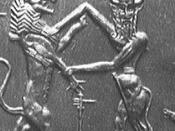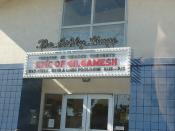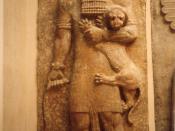In the Epic of Gilgamesh, Gilgamesh is a leader who endows extraordinary energy and power, overpowering the city he rules. Being two-thirds divine, and one-third human, he is too powerful to fit in with humans, yet he is not powerful enough to compete in the ranks of gods. He is a lonely and isolated man. Enkidu's role in this epic is to balance Gilgamesh's power, and make things better in Gilgamesh's city, Uruk.
From the beginning of this epic, it is known that Gilgamesh is a partially divine creature who was blessed with strength, courage, and beauty, but despite these good qualities he is a bad ruler: No son is left with his father, for Gilgamesh takes them all, even the children; yet the king should be a shepherd to his people. His lust leaves no virgin to her lover, neither the warrior's daughter nor the wife of the nobles.
He is arrogant, oppressive, and brutal. The people of Uruk complain of his oppression to the Sumerian gods, and they respond in creating Enkidu to counterbalance Gilgamesh.
Enkidu embodies qualities that are complimentary to those of Gilgamesh. Enkidu was brought up in the wild, eating grass in the hills. He is a leader, created out of the image of Anu, a fighter, like the war god Ninurta; a wild man, at home in the wilderness, covered with hair, ignorant of humans, at ease with animals. In contrast, Gilgamesh is a man of the city, having ties with humans.
Enkidu was a threat to civilization as a wild beast. He protected the animals, breaking the hunters' traps and filling in their pits. This threat was nullified by civilizing him. First the harlot woos Enkidu, stripping him of his beastliness. Then shepherds teach him how to prepare food, wear...


